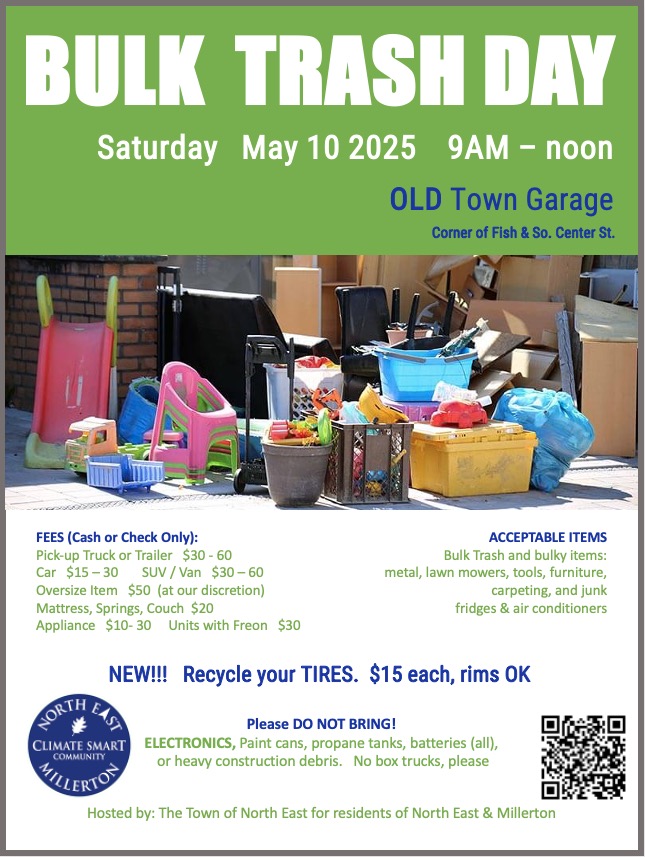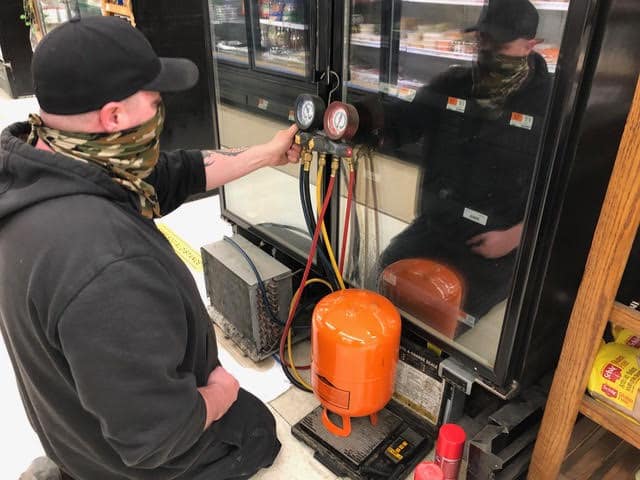BULK TRASH DAY

Bulk Trash Day is held seasonally at the old Town Garage on South Center Street for residents of North East and Millerton. You drop it off, Climate Smart volunteers will take care of the rest, making sure that it is recycled, repurposed for further use, or properly disposed of. At certain events electronics and tires are accepted. You are charged a modest fee based on the quantity of discardables you leave, which helps the Town defray the costs of using the dumpsters. Cash only, please.
Accepted items typically include metal, furniture, metal objects, lawn mowers, tools, appliances, carpeting, mattresses, broken stuff, beyond-repair stuff, great grandma’s chipped china, Dad’s boxes of National Geographics, your youthful collection of Coke cans from all over the world, which turns out to be worth $3.18 on eBay — all manner of once-prized possessions and junk.
NOT accepted are items you can safely dispose of in your household trash, such as latex paint cans (if the paint has dried or the can is empty), ordinary light bulbs (in a paper bag or box to confine breakage), dead alkaline household batteries, or empty aerosol cans.
NOT accepted are items that can be recycled elsewhere such as automotive batteries (see accepting locations below).
Also NOT accepted is anything potential harmful to you or those around you such as mineral spirits, florescent light bulbs, pharmaceuticals . . . the list of dangerous materials we blithely live among is impressively long. Anything that is flammable, explosive, poisonous, corrosive, injurious, or lethal please take elsewhere for disposal, as detailed below. The Climate Smart volunteers do not want to have to turn you away!
Why is it important to dispose of refrigerants properly?
Hydrofluorocarbons (HFCs) have a global warming effect up to 9,000 times greater than carbon dioxide. Gases are carefully and completely removed from refrigerators and air conditioners brought to Bulk Trash Day before they are scraped.

KATHY CHOW
KATHY CHOW
Degassing and checking for leaks at Sharon Farm Market.
NOT Accepted and what to do about it
Following are names of obvious hazardous wastes and what to do about them. Needless to say, do not discard any of them among your household trash. They could injure a sanitation worker and will damage the environment. That’s not disposal: that’s negligence. The rule for disposing of anything is: DO NO HARM.
Plus, it is usually against the law.
Dutchess County accepts a great variety of material on its semi-annual Household Hazardous Waste and Electronics days — but not everything. Excluded stuff generally has to go back to its retail source. But don’t take our word for it. We are journalists and science majors, but we are not infallible.
Official guidance
- For legal and regulatory guidance, call the NYS Department of Environmental Conservation, Division of Hazardous Substances Regulation: 518-485-8988 or 800-462-6553.
- For household hazardous waste collection programs in this area, call the Dutchess County Resource Recovery Agency: 845-463-6020
- For bigger stuff visit Dutchess County Solid Waste Managment website or call 845-463-6020
- For the leading local carting service, call Welsh Sanitation (a division of Royal Carting): Amenia Office 845-877-9354; Wingdale Transfer Station 845-832-3828
Asbestos products: Call an asbestos removal contractor.
Building or construction debris: Contact a carting or dumpster service.
Aerosol containers: Empty contents into a box or bag in a well-ventilated area such as outdoors (highly recommended). Then dispose in household trash.
Car batteries: Return to an auto center or car repair shop.
Fluorescent bulbs: All contain mercury and are hazardous waste. Take CFLs (compact fluorescent lamps) to a big-box retailer such as Lowe’s and Home Depot, which have CFL drop boxes. Take fluorescent-tube lights to a hazardous waste event and please tape them together or put in a box to minimize breakage.
Latex paint: Dry the paint using kitty litter, sawdust or the sun. Re-lid the can, put in a sturdy plastic bag and throw in the trash.
Hazardous liquids: To rid yourself of any, including the following, make an appointment with a hazardous waste collection program: Acids 💀 Adhesives 💀 Chemicals 💀 Metal polish 💀 Oil and lead paints 💀 Paint strippers 💀 Pesticides 💀 Poisons 💀 Preservatives 💀 Resins 💀 Sealants 💀 Solvents 💀 Tar 💀 Waterproofing
Medical (biohazard) waste: This is a federal matter — go to the EPA website for expert advice.
Motor oil: Return to an auto center or car repair shop.
Pharmaceuticals and medications: Call the local or state police or sheriff.
Propane or other flammable-gas cylinders: Return to the source or a refill station.
Radioactive materials: Contact the US Nuclear Regulatory Commission.